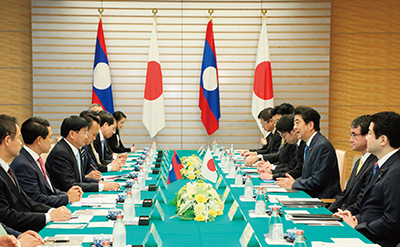(2) Humanitarian Assistance during Natural Disasters
Japan stands ready for the immediate provision of emergency assistance in response to requests from governments of affected countries or international organizations when large-scale disasters occur overseas. There are fi ve types of Japan Disaster Relief (JDR) teams that provide humanitarian assistance: (i) Search and Rescue Team, (ii) Medical Team, (iii) Infectious Diseases Response Team to implement measures to combat infectious diseases, (iv) Expert Team to give technical advice or guidance on emergency response measures and recovery operations, and (v) Self-Defense Force Unit to undertake medical activities, transportation of aid supplies and personnel when it is deemed particularly necessary in responding to large-scale disasters. These fi ve types of teams are dispatched either individually or in combination.
Emergency relief goods are provided as an in-kind assistance. Japan stockpiles tents, blankets, and other supplies needed for people affected in the immediate aftermath of a disaster, in four overseas warehouses. In 2018, Japan provided emergency relief goods to Djibouti, Guatemala, Democratic Republic of the Congo, andIndonesia, etc.
In addition, to relieve the people who have been displaced or affected by natural disasters and/or conflicts overseas, Japan implements Emergency Grant Aid to the governments of affected countries as well as international organizations. In many cases, Japanese NGOs contribute as partners when these international organizations engage in actual emergency assistance.

At the Japan-Laos Summit Meeting in October 2018, Prime Minister Thongloun Sisoulith of Laos expressed his gratitude for the emergency assistance provided by the Government of Japan in response to the flooding that resulted from the dam collapse in late July. (Photo: Cabinet Public Relations Office of the Government of Japan)
Additionally, Japanese NGOs provide various forms of assistance to those affected by disasters in regions that government aid does not always reach by utilizing ODA funds to meet their needs. Japan Platform (JPF), an emergency humanitarian aid organization established through the partnership and cooperation of NGOs, business communities and the Government of Japan, dispatches member NGOs to provide assistance to refugees, displaced persons or people affected by conflicts or natural disasters. In 2018, programs were implemented to support earthquake and tsunami victims on Lombok Island and Sulawesi Island in Indonesia and flood victims in Laos and Mongolia.
Disaster response is a shared concern to Japan and the ASEAN, which are beset by numerous natural disasters. In order to strengthen the capacity of the ASEAN Coordinating Centre for Humanitarian Assistance on Disaster Management (AHA Centre), established in 2011, Japan dispatches personnel and provides support for information and communications technology systems, along with the provision of emergency reserve supplies and support for the development of a management and transport system for goods.
